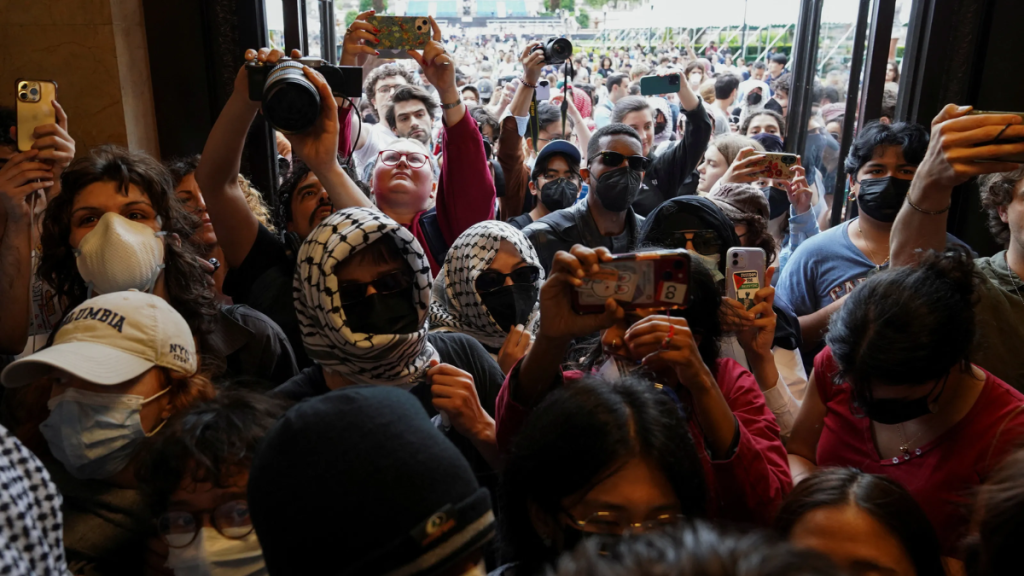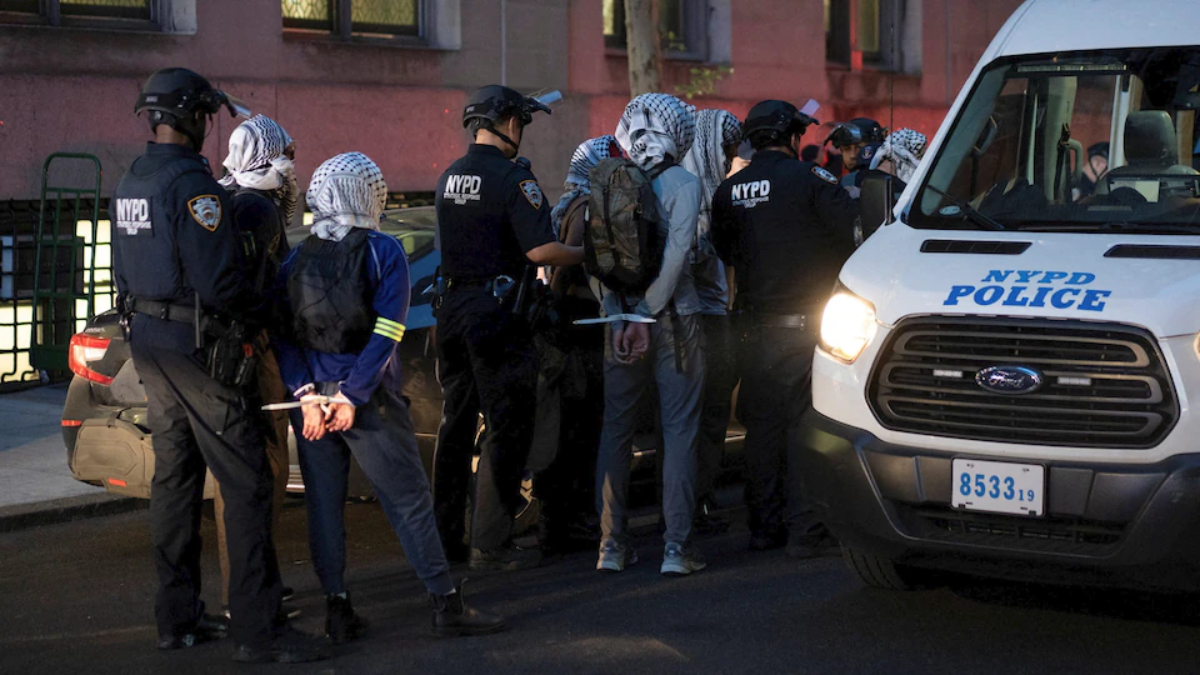On May 7, 2025, Columbia University became the focal point of escalating tensions surrounding the Israeli-Palestinian conflict when pro-Palestinian protesters occupied the iconic Butler Library.
The demonstration, organized by Columbia University Apartheid Divest (CUAD), sought to pressure the university into cutting financial ties with entities connected to Israel.
By the end of the night, approximately 80 individuals were arrested by the New York Police Department (NYPD), following a university request to clear the library due to safety concerns and academic disruptions.
Demonstrators Occupy Butler Library in Show of Solidarity with Gaza
Wearing keffiyehs and face coverings, the protesters entered the main reading room of Butler Library, where they hoisted Palestinian flags and chanted slogans advocating for Palestinian rights and resistance.
The demonstrators renamed the occupied space the “Basel Al-Araj Popular University,” paying tribute to the Palestinian intellectual and activist who was killed by Israeli forces in 2017.
According to organizers, the protest was a direct response to what they view as Columbia’s complicity in “Israeli apartheid” through its financial investments. CUAD demanded full disclosure of the university’s financial ties and immediate divestment from companies supporting Israel’s military operations in Gaza.
NYPD Responds to Columbia’s Call as Campus Safety Becomes a Priority
Columbia University’s administration stated that it only called in the NYPD after protesters refused to vacate the library peacefully. Acting President Claire Shipman said the administration had a duty to ensure the safety and academic integrity of the campus.
“The occupation of Butler Library was outrageous and posed an unacceptable risk to our students and staff,” she said. Two public safety officers were reportedly injured while responding to the incident.
The arrested protesters are now facing charges including trespassing and disorderly conduct. It remains unclear how many of them are Columbia students or outside activists.

Political Leaders and Community Groups Respond to Columbia Protest
The protest has stirred intense political and community responses. New York City Mayor Eric Adams condemned the demonstration, describing it as dangerous and unnecessary. “Parents need to have serious conversations with their kids.
These students are not exercising free speech; they’re engaging in disruptive and potentially dangerous behavior,” Adams remarked.
Meanwhile, Secretary of State Marco Rubio intensified the situation by calling for a federal review of visa statuses for any non-citizen protesters, referring to them as “pro-Hamas thugs.” His remarks have sparked concerns among international students about surveillance and immigration repercussions for campus activism.
Jewish community organizations also voiced serious concerns about the atmosphere on campus. Some students reported feeling threatened and unsafe during the protest, claiming the chants and imagery created a hostile environment.
These concerns have revived calls for Columbia and other institutions to implement stronger protections for Jewish students.
Federal Scrutiny and Threats to University Funding
Columbia University now faces mounting federal scrutiny. The Trump administration has threatened to withhold up to $400 million in federal funding, citing the institution’s alleged failure to ensure the safety of Jewish students during past demonstrations.
This is not the first time the university has been in the spotlight; prior protests earlier in 2025 also led to accusations that the administration had not done enough to address antisemitic incidents.
These pressures place Columbia in a challenging position—trying to balance freedom of expression and protest with maintaining a safe, inclusive environment for all students.
Campus Activism and Free Speech in the Spotlight
The Columbia protest highlights the ongoing tension in academic settings over how universities handle issues of free speech, political expression, and student safety.
As the Israeli-Palestinian conflict continues to stir global reactions, universities like Columbia are increasingly becoming battlegrounds for ideological and geopolitical debates.
Student-led movements have long used campus protests as a tool for social change, but the heightened polarization of today’s political climate—and the swift involvement of law enforcement—reflects a growing trend toward crackdowns on student activism.
For universities, this event is a wake-up call to develop clearer policies on protest rights, law enforcement involvement, and transparent financial practices.
How Columbia responds in the coming weeks will set a precedent not only for its own campus but for other institutions navigating similar challenges.
Conclusion: A Pivotal Moment for Campus Protest Culture
The occupation of Butler Library at Columbia University and the subsequent arrests mark a pivotal moment in the history of campus activism. With federal funding, international student status, and campus safety on the line, the stakes have never been higher.
As public scrutiny mounts and national leaders weigh in, the future of protest culture in higher education remains uncertain.
For further coverage on campus protests and their broader impact, visit The Guardian and Reuters.
Disclaimer – Our team has carefully fact-checked this article to make sure it’s accurate and free from any misinformation. We’re dedicated to keeping our content honest and reliable for our readers.
